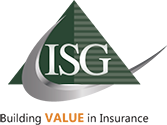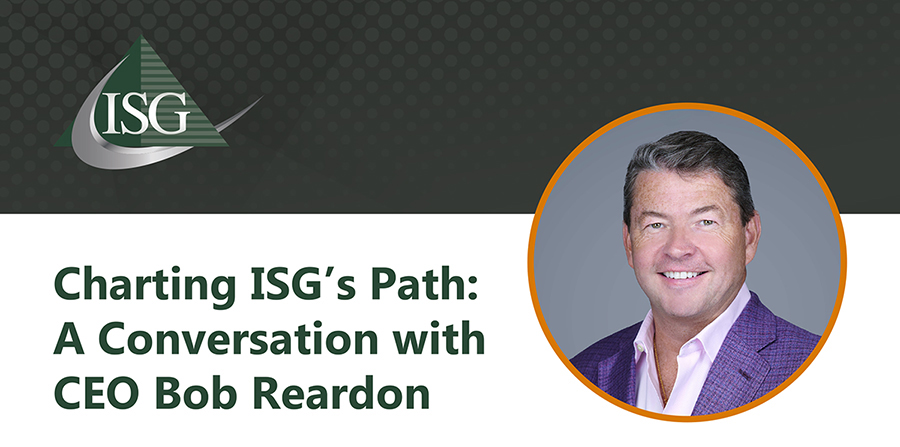Ever wondered about ISG’s early history? Or where the company is headed in the future? We recently sat down with our CEO Bob Reardon to get his insights.
It wasn’t an accident that a company founded to provide independent medical evaluations morphed into a full-service provider of claims support services. In fact, according to Bob Reardon, ISG’s chief executive officer, the wheels were set in motion during the earliest years of the company.
“When most people think of our company’s past, they think of us as an investigations company,” said Reardon. “The reality is that the company’s history precedes investigations.”
In 1990, Reardon founded an independent medical evaluation (IME) company to help insurance carriers obtain prompt and objective and high-quality medical reviews. He established a network of qualified providers and created rigorous standards that ensured consistent report quality for clients. This focus on quality helped carve a niche in the Northeastern region of the United States, and within five years, the company grew to become a national IME provider.
Meanwhile, as the company established itself as a top provider of IMEs, Reardon saw a new area where insurers needed help. He turned to his brother, Patrick, and launched an investigations business, serving regional insurance carriers. It began with a sole investigator and rapidly expanded to offer regional, then national services through a team of investigators. In the years that followed, the Reardon brothers grew their businesses and combined services under one company brand, ISG.
“It was easy to see there were tremendous synergies to having both services provided by a single company,” said Bob Reardon. “We knew it would make it easier for claims organizations if we merged, and so we did, and it was the greatest decision we made for ISG.”
As ISG Grew, A New Focus on Technology and Program Management Emerged
The newly combined companies, operating under the single name of ISG, continued to make headway. Beginning in 2012, the company’s dynamic shifted as it started working with the top 50 largest insurance companies.
“When we got solicitations to work with the largest carriers in the nation, there were new barriers to entry,” Reardon recalls. “The expectations were higher and the investments in technology and data security were bigger.”
Technology was changing rapidly, and Reardon said he knew it was critical to invest in the right infrastructure to support growth.
“We knew the best way to support our clients was to lean into their ways of doing things, so we mapped our systems and processes to our clients’ way of managing claims versus requiring them to adopt to ours,” he said. “Everything we did, and still do today, is focused on making the claims processes more efficient for claims professionals and supporting carriers in reducing claim cycle times.”
Another key discipline Reardon said the company focused on developing during this period was an account management structure that gave clients consistent management across all service lines.
“The goal was to ensure clients would experience seamless service regardless of where they interacted with the company,” he said. “This approach has not only enhanced client satisfaction but also fostered stronger relationships built on trust and reliability and continues today.”
The company not only invested in building out our account management team, but in distilling a culture of customer centricity across every department. While the account management team is on the front lines, every department is constantly challenged to prioritize customer needs and think of new ways to enhance services to bring new value to clients.
Today, personalized attention has become the cornerstone of ISG’s service model. It includes providing each customer a dedicated customer success team that is committed to understanding client business goals and providing the support needed to ensure success. Each customer knows they have a dedicated team and single source for information. In addition to day-to-day operational support, the company’s account teams focus on strategic goals and long-term planning through use of metrics, quarterly business reviews and onsite discussions.
A New Era: One Company. One Logo. One Partner.
In 2019 the company entered a new phase of growth fueled by acquisitions. Over the next four years, ISG acquired seven companies and expanded the company’s service portfolio to include records management and clinical and medical nurse case management services.
“We saw an opportunity to make it easier for our clients by managing more services needed for a claim,” said Reardon. “Instead of a claims professional having to send out and track multiple referrals across several different companies, creating inefficiencies and additional administrative work, our team manages multiple service requests with a single referral, saving both time and money.”
Today, Reardon thinks many people are unaware ISG has acquired so many companies, as each time a company is acquired, its services are consolidated under the ISG brand.
“During discussions with senior executives at insurance carriers, they welcomed the idea of having multiple service offerings under one brand and appreciated the transparency of operating under a single logo,“ said Reardon.
In fact, the company’s current tagline ‘One Company. One Logo. One Partner.’ was the direct result of a conversation with a customer who thanked ISG for operating transparently.
What Lies Ahead: The Future for the Industry and for ISG.
Looking to the future, Reardon says the looming talent crisis will be a challenge facing all companies with the continued retirement of baby boomers coupled with difficulties attracting younger employees to the insurance industry.
ISG has long used a talent acquisition strategy that focuses on hiring for potential versus for specific positions. This strategy focuses on the prospective employee’s ability to grow with the organization and take on new roles over time.
“The ability for talented people to move around and be promoted within the organization has been a key part of the company’s success for nearly three decades,” said Reardon. “It’s helped us establish a tenured workforce as our team members recognize that as they help the company grow, new opportunities open for them as well.”
Another thing Reardon has done, which he admits even surprises himself, was to change his stance on a remote workforce. Once a firm believer that employees needed to come into an office, the coronavirus health pandemic changed that.
When health conditions changed and employees were cleared to return to the office, Reardon realized that it wasn’t what most of his employees wanted. Despite some initial challenges moving to a fully remote environment at the start of the pandemic, he found that remote working increased productivity and job satisfaction and he didn’t want to change that in the post-pandemic world.
“With a remote working schedule, employees now have more flexibility in their daily schedule and extra time outside of work gained from not dealing with the hassles of morning and evening commutes,” said Reardon. “Our investments in remote work capabilities to ensure tight data security have yielded positive results. I truly believe the workplace of the future will continue to be transformed as technology changes and companies embrace new ways to connect, monitor and empower employees.”
The way insurance carriers and their business partners work together will also be enhanced by new technologies. Reardon sees technology as the largest driving force behind further transformation, not only in product development but around security as well.
He predicts that a HITRUST certification will be a requirement for any business working with a large carrier. ISG has made significant investments to ensure the company stays at the forefront of evolving cybersecurity security requirements and is committed to retaining HITRUST and other necessary certifications as the cyber industry evolves.
In terms of development, the company’s technology initiatives continue to focus on reducing administrative tasks for clients, making it easier for claims professionals, nurse case managers and legal counsel to make referrals and access files.
“Having clients log into portals to send or retain information will become a thing of the past,” says Reardon. “We’ve been working to get clients off any process that requires them coming to us. Instead, we’re directly integrating with their technology so claims professionals never have to leave their own claims systems.”
No technology conversation in 2024 can conclude without discussing artificial intelligence. Reardon says the company has embraced AI and will soon be deploying new functionality that uses AI to bring further efficiencies to the services ISG provides. The company has been deliberate in the way it’s using AI, keeping all data “on premise,” or within its own internal network, to secure data. The AI-powered solution is called Socrates.
However, according to Reardon, “That part of our story is for the next chapter of our company’s history, and you’ll just have to stay tuned,” he teased.
The good news is you won’t have to wait long. Socrates will be rolled out later this year.




